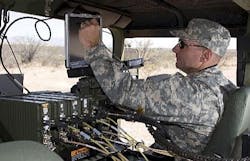Telcordia to provide Army with mobile vetronics communications and computing environment
WARREN, Mich., 8 April 2012. U.S. Army vetronics researchers are working with engineers at Telcordia Technologies Inc. in Piscataway, N.J., to develop an affordable communications and computing environment for Army vehicles under terms of an upcoming contract from the Army Contracting Command. Telcordia specializes in mobile, broadband, and enterprise software.
Army officials announced their intention last week to award Telcordia Technologies a sole-source contract for the Mobile Computing Application Platform (MCAP) Phase V. The contract, which has yet to be negotiated, will be awarded on behalf of the Army Tank Automotive Research, Development and Engineering Center (TARDEC) in Warren, Mich.
Army researchers are asking Telcordia Technologies to provide a sustainable, mobile, vehicle-centric, low cost, integrated, distributed communications and computing environment by linking together commercial off-the-shelf (COTS) products to reduce vetronics development, acquisition, and sustainment costs.
The upcoming contract calls for Telcordia Technologies to provide as many as 7,500 man-hours of engineering services over 12 months to build, test, demonstrate, and install MCAP Phase V software and equipment. MCAP is for the National Guard and emergency responders carrying out homeland defense and civil support missions.
For questions or concerns about this sole-source contract, phone Army contract specialist Michael Ivkov at 586-282-9754, or contracting officer Pamela Grozdon at 586-282-9751. More information is online at www.fbo.gov/index?s=opportunity&mode=form&tab=core&id=619f816cb0f2864632051e6b1d928731.
For additional information contact Army TARDEC online at http://tardec.army.mil, or Army Contracting Command at www.acc.army.mil.
Follow Military & Aerospace Electronics and Avionics Intelligence news updates on Twitter

John Keller | Editor
John Keller is editor-in-chief of Military & Aerospace Electronics magazine, which provides extensive coverage and analysis of enabling electronic and optoelectronic technologies in military, space, and commercial aviation applications. A member of the Military & Aerospace Electronics staff since the magazine's founding in 1989, Mr. Keller took over as chief editor in 1995.

